Are you a mobile homeowner looking to make your home more energy efficient? Energy-efficient upgrades for mobile homes are not only essential for reducing utility bills but also contribute to sustainable living. By implementing these upgrades, you can significantly enhance the energy efficiency of your home while minimizing your environmental impact.
10 Ways to Boost Energy Efficiency in Mobile Homes
Mobile homes, like any other housing, can benefit from various energy-saving upgrades. From insulation improvements and high-efficiency appliances to solar panels and smart thermostats, there is a wide range of options available. These upgrades not only help reduce energy consumption but also create a more comfortable living environment.
Energy-efficient upgrades offer numerous advantages for homeowners. Not only do they lead to cost savings on utility bills, but they also increase the value of your mobile home. By embracing sustainable practices, you contribute towards protecting the planet and promoting a greener future.
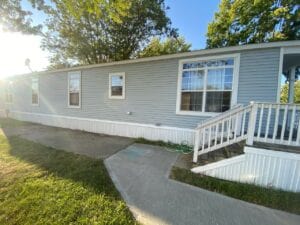
So why wait? Let’s explore some common energy-efficient upgrades for mobile homes and discover how they can transform your living space into an eco-friendly haven!
Benefits of Energy-Efficient Upgrades for Mobile Homes
Lower utility bills and long-term cost savings
One of the key benefits of energy-efficient upgrades for mobile homes is the significant reduction in utility bills. By implementing energy-saving measures, homeowners can enjoy substantial savings on their monthly energy expenses. For instance, installing insulation in the walls and roof helps to minimize heat transfer, resulting in lower heating and cooling costs throughout the year. Similarly, replacing old windows with double-pane or low-emissivity (low-E) windows can prevent air leakage and reduce the need for excessive heating or air conditioning.
Moreover, incorporating energy-efficient appliances such as refrigerators, dishwashers, and washing machines can further contribute to cost savings. These appliances are designed to consume less electricity while maintaining optimal performance. By upgrading to these energy-saving models, mobile homeowners can significantly decrease their overall energy consumption and subsequently lower their utility bills.
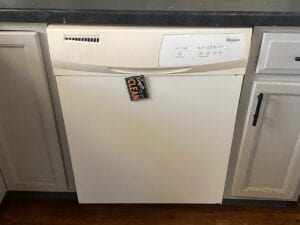
Improved indoor comfort and air quality
Energy-efficient upgrades not only lead to financial benefits but also enhance the overall comfort of living spaces within mobile homes. When a home is properly insulated, it becomes more resistant to external temperature fluctuations. This means that during hot summers or cold winters, the interior remains comfortable without relying heavily on heating or cooling systems.
Improved insulation also helps in maintaining consistent indoor air quality. By reducing drafts and air leaks caused by insufficient insulation, homeowners can effectively keep out dust particles, allergens, and outdoor pollutants from entering their living spaces. This leads to healthier indoor environments for both residents and visitors alike.
Reduced environmental impact and carbon footprint
Another crucial advantage of energy-efficient upgrades for mobile homes is their positive impact on the environment. By adopting sustainable practices through these upgrades, mobile homeowners actively contribute towards reducing greenhouse gas emissions and minimizing their carbon footprint.
For example, utilizing renewable energy sources like solar panels can generate clean electricity that powers various aspects of a mobile home’s electrical system. This reduces reliance on fossil fuels, which are major contributors to climate change. Energy-efficient upgrades decrease overall energy consumption, leading to a more sustainable and eco-friendly lifestyle.
Increased resale value and market appeal
Investing in energy-efficient upgrades for mobile homes can also yield long-term financial benefits through increased resale value and market appeal. As more homebuyers prioritize sustainability and energy efficiency, properties with these features tend to attract higher demand in the real estate market.
Mobile homeowners who have made energy-efficient improvements can highlight these upgrades as selling points when listing their property. By emphasizing the cost savings, improved comfort, and reduced environmental impact associated with these upgrades, sellers can potentially command higher prices and sell their homes faster.
Common Misconceptions About Energy Efficiency in Manufactured Homes
Myth: Energy efficiency is only for traditional houses, not mobile homes.
One common misconception about energy efficiency is that it only applies to traditional houses and is not relevant to manufactured homes. However, this couldn’t be further from the truth. In fact, energy-efficient upgrades can greatly benefit manufactured homes by reducing energy consumption and lowering utility bills. Just like traditional houses, mobile homes can also benefit from improved insulation, upgraded windows and doors, and more efficient heating and cooling systems.
Debunking the misconception that energy upgrades are expensive or unaffordable.
Another prevalent myth surrounding energy efficiency in manufactured homes is that the necessary upgrades are expensive or unaffordable for homeowners. While it’s true that some energy-efficient improvements may require an initial investment, there are plenty of cost-effective options available as well. For instance, sealing air leaks and adding insulation are relatively inexpensive upgrades that can significantly improve a home’s energy efficiency. Many utility companies offer rebates or incentives for homeowners who make energy-saving upgrades.
Addressing concerns about limited options for energy-efficient improvements in mobile homes.
Some people mistakenly believe that there are limited options. However, there are numerous upgrades specifically designed for these types of dwellings. For example:
Installing skirting
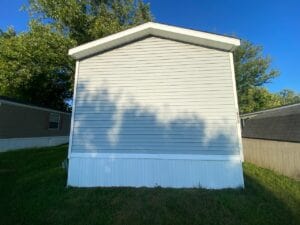
insulation can help prevent heat loss and improve overall energy efficiency.
Upgrading to ENERGY STAR certified appliances can reduce electricity usage.
Adding window film or shades can enhance insulation properties.
Using programmable thermostats allows homeowners to set temperature schedules based on their needs.
By exploring these options and consulting with professionals specializing in manufactured housing, homeowners can find suitable solutions to enhance their home’s energy efficiency.
You might also be interested in our article: The Average Electric Bill for a Mobile Home
Clarifying misconceptions about the effectiveness of energy-saving measures in manufactured housing.
There is often skepticism regarding the effectiveness of implementing energy-saving measures in manufactured housing compared to traditional houses. However, with the right upgrades and improvements, energy efficiency can be significantly improved in mobile homes. For instance, upgrading insulation can help regulate indoor temperature and reduce reliance on heating or cooling systems. Replacing old windows and doors with energy-efficient alternatives can prevent drafts and heat loss.
It’s important to note that the effectiveness of energy-saving measures may vary depending on factors such as climate, location, and the specific construction of the manufactured home. Therefore, it is advisable to consult with professionals who understand the unique requirements of manufactured housing to ensure optimal results.
Practical Tips for Increasing Energy Efficiency in Mobile Homes
Simple Lifestyle Changes that Save Energy
Making simple lifestyle changes can have a significant impact on reducing energy consumption in mobile homes. Here are some practical tips to help you save energy:
Unplug idle electronics: Many electronic devices continue to draw power even when they’re not in use. Unplugging them or using power strips with an on/off switch can prevent this unnecessary energy drain.
Adjust thermostat settings: Lowering your thermostat by just a few degrees during the winter and raising it slightly in the summer can lead to substantial energy savings. Consider wearing warmer clothes or using blankets instead of cranking up the heat, and utilize fans or natural ventilation to cool your home.
Optimize appliance usage: Use appliances efficiently by running full loads of laundry and dishes, as well as avoiding peak electricity usage hours when possible. Air-dry clothes instead of relying solely on the dryer.
Proper Use of Programmable Thermostats and Smart Home Technology
Programmable thermostats and smart home technology offer convenient ways to control your mobile home’s temperature settings while maximizing energy efficiency. Consider these tips:
Invest in a programmable thermostat: These devices allow you to set specific temperature schedules based on your daily routine, ensuring that heating or cooling is only active when needed. Adjusting temperatures while you’re away from home can result in significant energy savings over time.
Leverage smart home features: Smart thermostats provide additional benefits such as remote access through smartphone apps, learning capabilities that adapt to your preferences, and integration with voice assistants like Amazon Alexa or Google Assistant.
Regular Maintenance Practices for Optimizing HVAC System Performance
Maintaining your mobile home’s HVAC system is vital for its optimal performance and energy efficiency. Follow these maintenance practices:
Clean or replace filters regularly: Dirty filters restrict airflow, forcing the HVAC system to work harder and consume more energy. Clean or replace filters every one to three months, depending on usage.
Seal air leaks: Identify and seal any gaps or cracks around windows, doors, vents, and ducts. This prevents conditioned air from escaping and reduces the workload on your HVAC system.
Schedule professional maintenance: Arrange annual HVAC inspections by qualified technicians who can identify potential issues early on. Regular tune-ups help ensure that your system operates efficiently throughout the year.
Utilizing Natural Light and Ventilation Effectively
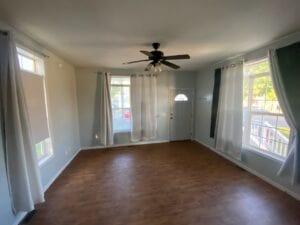
Harnessing natural light and ventilation can significantly reduce energy consumption in mobile homes. Here’s how you can make the most of these resources:
Maximize daylight: Open curtains or blinds during the day to allow natural light into your home. This not only reduces reliance on artificial lighting but also provides a pleasant ambiance.
Strategically use windows: During warmer months, open windows strategically to create cross ventilation, facilitating a cooling breeze without relying solely on air conditioning.
Inspecting and Upgrading Doors and Windows
One important aspect that should not be overlooked is inspecting and upgrading doors and windows. These entry points can often be a major source of air leakage, resulting in energy loss and higher utility bills. By sealing gaps around doors and windows, choosing energy-efficient options, and installing weatherstripping or caulking, you can significantly improve the efficiency of your mobile home.
Importance of sealing gaps around doors and windows
Gaps around doors and windows are common culprits for air leakage in mobile homes. These gaps allow conditioned air to escape outside while letting unwanted drafts enter inside. To prevent this energy waste, it is essential to seal these gaps effectively. By doing so, you create a barrier that keeps the desired temperature inside your home while preventing outside air from infiltrating.
Choosing energy-efficient doors and windows with proper insulation ratings
When upgrading your mobile home’s doors and windows, it is crucial to select options that are specifically designed for energy efficiency. Look for products with proper insulation ratings that meet industry standards. Energy-efficient doors and windows are typically constructed with materials that provide better insulation properties such as vinyl or fiberglass frames.
Installing weatherstripping or caulking as a cost-effective solution
If replacing all your doors or windows is not feasible due to budget constraints, there are still cost-effective solutions available to improve their efficiency. Installing weatherstripping or applying caulk along the edges can help seal any remaining gaps effectively. Weatherstripping comes in various forms like adhesive strips or door sweeps which can be easily applied to minimize air leakage. Caulk is another versatile option that fills small cracks or openings around window frames.
Considerations when upgrading single-pane windows
Many older mobile homes feature single-pane windows which offer minimal insulation value compared to newer options available today. Upgrading from single-pane to double-pane or low-emissivity (Low-E) glass windows can significantly enhance energy efficiency. Double-pane windows consist of two panes of glass with a layer of air or gas in between, providing better insulation against heat transfer. Low-E glass has a thin coating that reflects heat while allowing natural light to enter.
When considering upgrading your mobile home’s windows, keep the following factors in mind:
Cost: Double-pane and Low-E windows may require a higher upfront investment compared to single-pane windows, but they offer long-term energy savings.
Climate: The climate in your area plays a crucial role in determining the appropriate window type. For colder climates, double-pane or Low-E options are highly recommended to minimize heat loss.
State regulations: Check local building codes and regulations as some states have specific standards for energy-efficient upgrades.
Inspecting and upgrading doors and windows is an essential step towards making your mobile home more energy efficient. By sealing gaps, choosing energy-efficient options, and considering window upgrades carefully, you can ensure better insulation and reduce wasted energy.
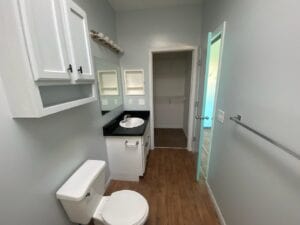
Preventing and Repairing Water Leakage and Seepage: 10 Ways to Boost Energy Efficiency in Mobile Homes
Water leakage and seepage can cause significant damage to mobile homes if not addressed promptly. Identifying common sources of water leaks, implementing proper maintenance practices, and repairing any damages are crucial steps in preventing water-related issues. Installing moisture barriers or vapor retarders can serve as preventive measures against seepage.
Identifying Common Sources of Water Leaks in Mobile Homes
Mobile homes are susceptible to various sources of water leaks. By identifying these common culprits, homeowners can take proactive steps to prevent potential damage. Some key areas to inspect include:
Roof Cavity: Check for any signs of roof leaks or damaged shingles that may allow water to penetrate the interior.
Plumbing Fixtures: Examine pipes, faucets, and toilets for any signs of leakage or dripping.
Siding: Inspect the exterior walls for cracks or gaps that could potentially let water seep into the structure.
Steps to Prevent Water Damage through Proper Maintenance Practices
Implementing regular maintenance practices is essential in preventing water damage within mobile homes. Here are some important steps homeowners should follow:
Roof Maintenance:
Regularly inspect the roof for loose or damaged shingles.
Clear debris such as leaves and branches from gutters and downspouts.
Apply a cool roof coating to improve energy efficiency while providing an additional layer of protection against leaks.
Plumbing Maintenance:
Insulate exposed pipes to prevent freezing during colder months.
Monitor water pressure regularly and address any sudden changes promptly.
Conduct routine checks on plumbing fixtures for leaks or drips.
Exterior Maintenance:
Seal any cracks or gaps in siding using appropriate caulking materials.
Ensure proper drainage around the foundation by maintaining clean gutters and downspouts.
Interior Maintenance:
Regularly check for signs of water damage on walls, ceilings, and floors.
Monitor humidity levels to prevent excess moisture buildup.
Repairing Damaged Roofing, Siding, or Plumbing Fixtures Promptly: 10 Ways to Boost Energy Efficiency in Mobile Homes
Prompt repairs are crucial in preventing further issues caused by water leakage. Ignoring damaged roofing, siding, or plumbing fixtures can lead to more extensive damage and costly repairs. If any signs of damage or leaks are detected, homeowners should take immediate action:
Engage professional roofers to repair damaged shingles or address roof leaks.
Hire licensed plumbers to fix any plumbing-related issues promptly.
Replace or repair damaged siding to prevent water seepage.
Installing Moisture Barriers or Vapor Retarders as Preventive Measures against Seepage
Installing moisture barriers or vapor retarders can act as preventive measures against seepage within mobile homes. These materials help control moisture levels and protect the structure from potential water damage. Here are some options for installation:
Apply a moisture barrier beneath the flooring to prevent ground moisture from seeping into the home.
HVAC System Maintenance and Repair for Energy Efficiency
Regularly cleaning or replacing air filters is essential for optimizing the efficiency of your HVAC system. Over time, dust and debris accumulate in the filters, obstructing airflow and forcing the system to work harder. By keeping the filters clean, you ensure that the air can flow freely, allowing your HVAC system to operate at its peak performance.
Professional maintenance and tune-ups are crucial for both heating and cooling units. Hiring a qualified technician to inspect your HVAC system annually can help identify any potential issues before they become major problems. They will check various components such as motors, belts, and electrical connections to ensure everything is functioning properly. They will perform necessary adjustments and lubrication to keep your system running efficiently.
Consider upgrading to energy-efficient HVAC systems with higher Seasonal Energy Efficiency Ratio (SEER) ratings. SEER ratings indicate how efficiently an air conditioning unit operates over a cooling season. The higher the SEER rating, the more energy-efficient the unit is. Upgrading to a higher SEER-rated system can significantly reduce energy consumption while maintaining optimal comfort levels in your mobile home.
10 Ways to Boost Energy Efficiency in Mobile Homes
Addressing common issues that affect HVAC efficiency is essential. Refrigerant leaks can cause your cooling system to work harder than necessary, resulting in increased energy consumption. If you suspect a refrigerant leak, it’s important to have it repaired promptly by a professional technician.
Ductwork problems can also negatively impact energy efficiency. Leaky or poorly insulated vent ducts allow cooled air to escape before reaching its intended destination, leading to wasted energy and reduced comfort levels inside your mobile home. Properly sealing ductwork or insulating it can help prevent these inefficiencies.
Upgrading Lighting, Appliances, and Insulation for Better Efficiency
Homeowners have several options to consider. Upgrading lighting, appliances, and insulation can significantly improve energy efficiency, resulting in lower energy bills and a more comfortable living environment. Let’s explore some key points to keep in mind when undertaking these upgrades.
Replacing traditional incandescent bulbs with energy-saving LED lighting
One of the easiest and most cost-effective ways to enhance energy efficiency is by replacing old incandescent light bulbs with energy-saving LED alternatives. LED lights consume significantly less electricity while providing the same level of brightness as traditional bulbs. Not only do they last longer, but they also emit less heat, reducing the strain on cooling systems during hot summer months. By upgrading your lighting fixtures to LEDs throughout your mobile home, you can make a noticeable difference in both your energy consumption and monthly utility bills.
Choosing ENERGY STAR certified appliances for improved energy efficiency
Another crucial aspect of enhancing energy efficiency in mobile homes is selecting appliances that are ENERGY STAR certified. These appliances are designed to meet strict standards set by the U.S. Environmental Protection Agency (EPA) regarding energy consumption. By opting for ENERGY STAR certified refrigerators, dishwashers, washing machines, and other household appliances, homeowners can reduce their overall electricity usage without sacrificing performance or functionality.
Benefits of adding insulation in walls, floors, and ceilings to reduce heat loss/gain
Poor insulation is often a major contributor to high heating and cooling costs in mobile homes. By adding insulation in walls, floors, and ceilings, homeowners can minimize heat loss during winter months and prevent excessive heat gain during summer months. Insulating materials such as fiberglass batts or spray foam insulation help create a thermal barrier that keeps conditioned air inside the home while preventing outside temperatures from affecting indoor comfort levels.
10 Ways to Boost Energy Efficiency in Mobile Homes
To further enhance insulation effectiveness:
Seal any gaps or cracks in walls, windows, and doors to prevent air leakage.
Install weatherstripping around windows and doors to reduce drafts.
Consider insulating ductwork to prevent energy loss during heating or cooling.
Utilizing reflective roof coatings or cool roofs to minimize heat absorption
In mobile homes, the roof plays a significant role in regulating indoor temperatures. By utilizing reflective roof coatings or opting for cool roofs, homeowners can minimize heat absorption from sunlight. Reflective coatings are designed to reflect a large portion of the sun’s rays, reducing the amount of heat transferred into the home. Cool roofs, on the other hand, are made of materials that naturally reflect more sunlight and absorb less heat compared to traditional roofing materials.
By incorporating these energy efficient features into mobile homes, homeowners can not only decrease their reliance on non-renewable energy sources but also contribute towards sustainable urban development. Upgrading lighting fixtures, appliances, insulation levels, and roofing materials are practical steps that have long-term benefits for both the environment and your pocket.
So why wait?
Conclusion: 10 Ways to Boost Energy Efficiency in Mobile Homes
Congratulations! You are now equipped with valuable knowledge on achieving energy efficiency in mobile homes. By implementing the tips and upgrades mentioned in this blog post, you can significantly reduce your energy consumption and lower your utility bills. Not only will you be saving money, but you will also be contributing to a more sustainable future.
To get started, assess your mobile home for potential areas of improvement. Inspect doors and windows for any gaps or leaks that may be letting precious heat or cool air escape. Address water leakage and seepage issues promptly to prevent further damage and energy loss. Regularly maintain your HVAC system to ensure optimal performance and consider upgrading to energy-efficient lighting, appliances, and insulation.
Remember, every small step counts. So take action today and start making a positive impact on both your wallet and the environment!
FAQs: 10 Ways to Boost Energy Efficiency in Mobile Homes
How much money can I save by making energy-efficient upgrades to my mobile home?
By implementing energy-efficient upgrades such as sealing air leaks, upgrading insulation, and installing efficient appliances, you can save up to 30% on your annual energy bills. The exact amount of savings will depend on factors such as the size of your home, current energy usage patterns, and the extent of the upgrades made.
Are there any government incentives available for energy-efficient upgrades in mobile homes?
Yes! Depending on where you live, there may be various federal or state-level programs that offer financial incentives for making energy-efficient upgrades to your mobile home. These incentives can include tax credits, rebates, or low-interest loans. Check with your local government or utility company to explore available programs in your area.
Can I perform these upgrades myself or do I need professional help?
While some upgrades like weatherstripping doors or windows can be done by homeowners themselves with basic tools, others may require professional assistance. For complex tasks like HVAC system maintenance or upgrading electrical systems, it is recommended to hire a licensed professional who specializes in mobile home energy efficiency.
How long does it take to recoup the cost of energy-efficient upgrades?
The payback period for energy-efficient upgrades varies depending on the specific upgrades made and your local energy costs. On average, most homeowners see a return on investment within 5-10 years. However, keep in mind that the long-term savings and environmental benefits far outweigh the initial costs.
Can I still make energy-efficient upgrades if I’m on a tight budget?
Absolutely! Energy-efficient upgrades can be implemented gradually based on your budget and priorities. Start with simple, low-cost improvements such as sealing air leaks or replacing old light bulbs with LED ones. As you save money from reduced utility bills, you can gradually invest in more significant upgrades like insulation or appliance replacements. Remember, every small step counts towards achieving greater energy efficiency!
You might also be interested in our articles:
New vs. Used Mobile Homes: Making the Right Choice
Mobile Home Fireplaces: Installation & Safety
Obtaining Title for Abandoned Mobile Home: Step-by-Step Guide

